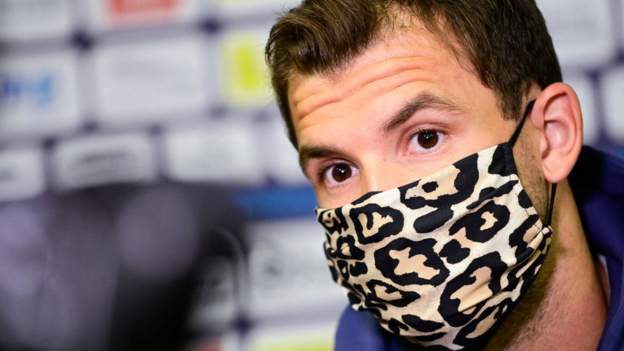
A steady flow of top athletes have tested positive for coronavirus since March, among them retired sprinter Usain Bolt, footballer Cristiano Ronaldo and world number one tennis player Novak Djokovic.
The vast majority have experienced mild or no symptoms, but some have experienced prolonged after-effects - a range of symptoms collectively described as 'long Covid'.
Speaking to BBC Sport, former world number three tennis player Grigor Dimitrov described the "very unpredictable" symptoms he suffered , and how the virus - contracted in June - "lingered for a while".
The 29-year-old Bulgarian said he perhaps "shouldn't have gone to the States" for the US Open in September, where he went out in the second round, because although he had tested negative, he still felt fatigued.
Meanwhile, the BBC has learnt that 85 Olympic and Paralympic athletes in England have tested positive for coronavirus.
Data released by the English Institute of Sport (EIS) shows 10% of them had symptoms lasting more than 30 days, and some have not yet returned to training.
All of the athletes with long-term symptoms are being studied by the EIS, with particular focus on their hearts, lungs, immune systems and psychological profiles.
Olympic rower Jonny Walton is one of those undergoing these extensive tests. He had been taking part in Team GB trials when he came down with the virus in March.
"We got on the rowing machine and it appeared that my physiology had just gone overnight, and just kind of fallen off a cliff," he told us.
'Couple of steps forward, one step backwards'
Reflecting on his return to playing in August, Dimitrov says: "I almost feel I shouldn't have gone to the States but I had to test myself, I had to know where my body was at.
"Every time I wanted to see it was maybe a couple of steps forward but maybe one step backwards."
Speaking from the European Open in Antwerp at the end of October, he said: "I feel way, way better - I don't even take naps any more or anything like that.
"But there are some things here and there that you're like 'Oh man, that's not the same'. It's fine, I get it but who knows how this thing is going to go. All I hope is that I don't get it again."
Dimitrov is unsure where or when he contracted the virus but tested positive in June after playing at the Adria Tour in Serbia and Croatia.
He said he has no regrets about playing the exhibition events, which were organised by Djokovic and proved controversial after several players visited a nightclub and later tested positive for coronavirus.
But he explained why he felt he needed to go public about having the virus.
"As a player I could have easily stayed home and just not said a word, right? But I said to myself 'no, that's not right'. There were so many kids around me and god forbid they had some other health issues, then what would I do? Can I live with myself? No I cannot."
'It took two or three months to finally get over it'
Rower Walton, 30, is aiding research on long-term coronavirus symptoms after the virus took a physical and mental toll on him.
"My heart rate was massively up. We do do a lot of altitude training but it was like being at altitude and having to breathe through a straw," he says of his early symptoms.
"It took a good two to three months to finally fully get over it. Looking back it is a little bit scary and it really does show that anyone can get it."
He is now back in full training and vying for selection for the postponed Tokyo Olympics.
"Going through the tough times on your own, you do have huge doubts, like will I ever get back to where I was? The numbers were so far away from what I perceived normal that it was a hard time to get through."
New area of sports science
The early data from the EIS has shown no predisposition for athletes to have prolonged issues from coronavirus but research is being conducted because symptoms and recovery profiles have been varied.
Dr Rod Jaques, medical director of the EIS, said: "I think it's very important to stress that as a medical community we are still starting to understand what long symptoms are around the Covid problem.
"It's too early to say at this stage whether there are any higher-risk sports than others.
"If you do develop symptoms in any aspect of Covid that we're now more familiar with, you should back off exercise very quickly."
The Premier League is also looking at this issue and is working with the University of Manchester. It says it would refer any concerning trends to them.
Through continued testing, it is hoping to build a picture of how each player that tests positive for coronavirus recovers.















 Phone: (800) 737. 6040
Phone: (800) 737. 6040 Fax: (800) 825 5558
Fax: (800) 825 5558 Website:
Website:  Email:
Email: 






